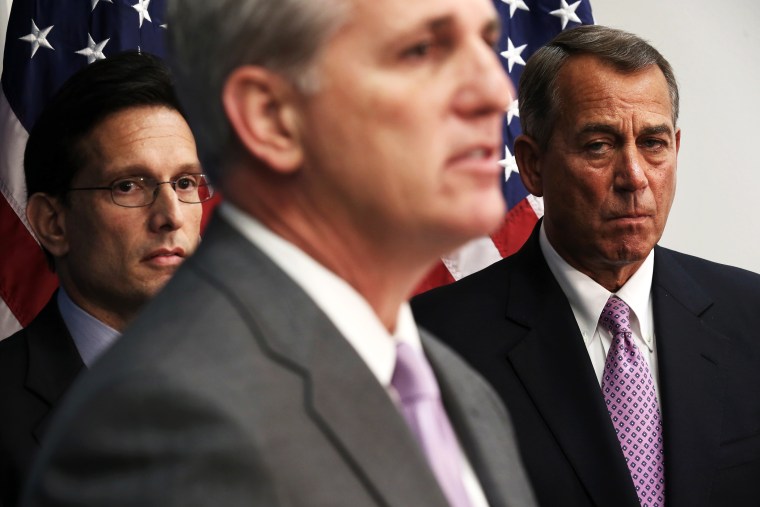House Republican leaders have assured the public, more than once, that they're eager to present a conservative alternative to the Affordable Care Act. It's been in the works for nearly five years and it's going to be awesome -- any minute now.
Yesterday, however, House Majority Whip Kevin McCarthy (R-Calif.) told Bloomberg News that the plan is being delayed "at least a month." Of course, there was no target date in mind for its introduction, so no one has any idea what a one-month delay actually means in practical terms. For those of us who suspect the GOP plan will always remain just around the corner, yesterday's news simply meant adding "at least a month" to "never."
Regardless, from a Republican perspective, what seems to be the trouble? Sahil Kapur talked to a "congressional GOP health aide" who described the intra-party challenges.
He said devising an alternative is fraught with the difficulty of crafting a new benefits structure that doesn't look like the Affordable Care Act. "If you want to say the further and further this gets down the road, the harder and harder it gets to repeal, that's absolutely true," the aide said. "As far as repeal and replace goes, the problem with replace is that if you really want people to have these new benefits, it looks a hell of a lot like the Affordable Care Act.... To make something like that work, you have to move in the direction of the ACA."
Imagine that.
It didn't get much attention at the time, but back in 2009, four former Senate Majority Leaders -- Republicans Howard Baker and Bob Dole working with Democrats Tom Daschle and George Mitchell -- got together to present a bipartisan blueprint for health care reform. The result, to borrow a phrase, looked a hell of a lot like the Affordable Care Act.
In 2006, then-Gov. Mitt Romney (R) worked with Massachusetts Democrats on their own reform model. What they came up with also looks a hell of a lot like the Affordable Care Act.
A pattern seems to be emerging.
For those who hate -- or at least claim to hate -- "Obamacare," the system itself is an outrageous assault on liberty, free enterprise, American values, and quite possibly, moms and apple pie. But if we move past the hysterics, even congressional Republicans, hardly a moderate bunch, are finding that in order to do health care reform properly, creating a system that stands a reasonable chance of success, there are some basic elements that are hard to ignore.
And once those unavoidable provisions -- "community rating, the individual mandate, and subsidies" -- are in place, reform plans are going to resemble the system Democrats approved in 2010.
To be sure, reformers could go in a very different direction -- or more accurately, a far more progressive direction -- and approve Medicare for all. This, too, would achieve the same goals without the ACA chassis.
But for Republicans, this would be worse. Indeed, this is what happens when policymakers start with a solution and try to work backwards to reach the agreed upon goal. GOP lawmakers decided in advance that Medicare for all isn't an option. Then they decided their plan couldn't resemble the Affordable Care Act.
What's left? Not a whole lot. Republicans are stuck with some stale half-measures -- tort reform and buying across state lines -- that no one seriously considers a health care "plan."
GOP policymakers can keep looking for an alternative solution for "at least a month," but they're likely to be disappointed.
